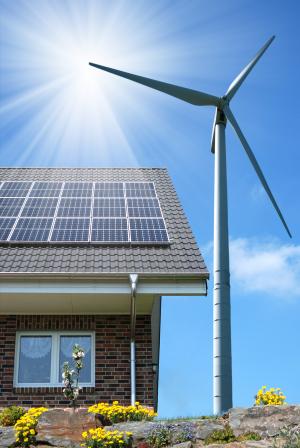Centralised France may lack the clout at local government level to ease its new shift to greener energy, contrasting with the regional and grass-roots power that helped push through the rise of renewables in Germany.
France, the world's most nuclear reliant country, has vowed to cut its dependency on the atom and boost its lagging renewable energy output, Reuters reported.
A failure to empower local authorities on energy issues in the next few years could put a brake on its ambition to cut the share of nuclear power in the electricity mix to 50 percent by 2025, down from 75 percent now, green energy experts and local players say.
Across the Rhine, the installed capacity for wind and solar electricity production is already equivalent to France's 58 nuclear reactors, even though the output is highly variable.
"In France, we have a centralised state and centralised energy production, so everything goes in the same top down direction, countering action from local communities wanting to develop their own projects," said Melanie Persem, head of the Franco-German office for renewable energy coordination.
"Whereas in Germany, towns and citizens are the force behind renewable energies."
Germany's cities and federal states have taken the initiative in launching ambitious renewable energy projects, and German individuals own about 40 percent of renewable projects, in which they invest, Persem said.
"It's like if you put your money in the bank or in an investment fund," she said.
This local dynamism makes Germany's federal government decision to phase out nuclear power over the next 10 years more feasible, with renewable energy making up about a quarter of German electricity demand already.
 In France however, green energy accounts for 12 percent of power needs, with solar and wind providing only 3 percent and the rest coming from hydropower. However, advocates of the French centralised system say this means distribution costs in France are cheaper than in Germany.
In France however, green energy accounts for 12 percent of power needs, with solar and wind providing only 3 percent and the rest coming from hydropower. However, advocates of the French centralised system say this means distribution costs in France are cheaper than in Germany.
The country's fragmented administrative organization, with such a high number of layers it is nicknamed a "mille-feuille" - the name of a sweet cream slice made of layer upon layer of paper-thin puff pastry, is not helping.
Its 22 regions, subdivided into 96 departments and 35,303 communes are mainly dependent on Paris for their income and only have limited investment capacities.
Nicolas Garnier from Amorce, a group of French local communities advising on energy and waste issues argues that President Francois Hollande's national debate on the transition towards a more energy responsible society should focus on who decides on energy matters rather than on energy types.
"If we remain stuck in a national approach, here's the story for the next 35 years: we will reduce nuclear energy a bit, increase wind power by a smidgeon, struggle to contain consumption, but we won't succeed," he said.
An example of the traditional, top-down approach to energy policy can also be seen in the way France's electricity grid was built.
"We were just after the war and the goal was to bring electricity to the whole of France. This contract was fulfilled very well, but today local authorities are forced to renew their contract with ERDF indefinitely," said Yannick Regnier of the CLER green lobby.
Some 95 percent of the territory's electricity supply network is now managed by ERDF, a fully-owned branch of former state monopoly EDF.
"The French grid is a top-down network, conceived for a centralised production. It has to be restructured so power can flow in both directions. Today the grid is only used to distribute power from nuclear plants," Garnier from Amorce said.
While big wind and solar power plants are directly connected to the high-voltage transport grid, smaller production facilities are wired to one-way local distribution networks, meaning the electricity has to be consumed locally.
"ERDF's monopoly on distribution is a big handicap. The only concessionaire possible raises money from us and at the same time doesn't justify in what name it levies these amounts, tens of millions of euros per year," said Green MP Denis Baupin.
A few exceptions with more local government control exist in France, such as the town of Grenoble in the Alps, which are also coincidentally at the cutting-edge of green energy use. By contrast, Germany has some 900 distribution networks agencies, Persem of the Berlin-based Franco-German renewable office said.
But French industry are not ready to give up Europe's lowest energy costs.
"Renewable energies will have to be added to the energy mix providing that it doesn't make industrial energy costs more expensive," the UNIDEN lobby of heavy energy users warned in a statement.